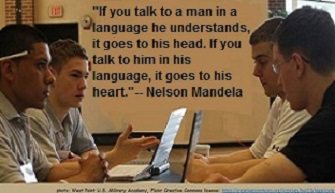How to Get English Conversation Practice
Are you having trouble finding partners for English conversation practice? You probably know it's important, especially if you want to speak more fluently. But getting that practice can be hard! Here are some hints for getting started.
(If you don't need help starting, you can jump directly to
- Guidelines for Casual Conversation (with ideas for safe topics, topics to avoid, & how to change the subject or end a conversation).
- Examples of English Conversations
- Contractions in Casual Conversation
- & How to Improve your English Fluency.
Finding English Conversation Practice Partners
Look for chances
to talk with native English speakers.
Maybe there is someone in your city-- or online via Skype or a chat program-- who would be glad to talk with you.
Many English speakers enjoy sharing experiences with someone from a different background.
You might even find someone trying to learn your language. You could help each other and take turns practicing each language.
Talking with a friend (native speaker or not) is a great way to practice your English. Don’t be afraid to make mistakes. The more you try, the faster you’ll learn.
(Fear of making mistakes hinders many people from ever becoming fluent in a second language.)
Ask your English conversation practice partner to tell you if you make a mistake or if he or she can’t understand you. Correct it and try again.
Ask for a repeat or an explanation if you don’t understand something-- and enjoy the conversation! A new language can give a whole new perspective on so many things!
Having trouble finding an English conversation practice partner? If your friends and local organizations can’t help you, try an online English forum or one or more sites recommended by FluentU.
(Some of these 12 sites for finding partners are free (especially the later ones mentioned), and some charge-- look through them to find the best one for you.)
You might also try talking with the robot at ESL Fast, and see how it works for you.
Guidelines for Casual Conversation
("Small Talk")
- American (& Australian) English-speakers tend to be less formal than speakers of some languages. A safe guide (as with many other questions): follow your partner’s lead. If the people you are talking with use first names or very casual speech, you can also.
- It’s perfectly acceptable to ask for clarification. (In fact, it’s a good idea, even for native speakers.) Try:
“Could you repeat that a little more slowly?”
“So we should meet next Thursday at 3 PM.”
“So you’re saying it’s important to invest in staff development. Is that right?”
- Listen to native speakers chatting or doing business to get an idea of what is appropriate where you are. (This is important for English speakers working with people of other cultures, too!)
- It’s best to chat briefly to establish rapport and a basis of common interest before you get down to business. In the U.S. it isn’t necessary to begin every conversation by asking about the other person’s health and family. (I’ve noticed my Mexican friends do this even during a brief phone call to confirm plans.) That's not required here.
- However, it’s a good idea to start a business conversation (even a job interview) with a minute or two of chatting. You can talk about the weather, a recent sports event, or possible common interests.
- If you’re not sure how much chatting is appropriate, start with a friendly greeting and let the other person take the lead.
- Safe topics for small talk include the weather, occupation, sports, or hobbies and interests
- Avoid discussing politics and religion unless you know someone well. Many people have such strong feelings about these that it can be hard to stay polite. Also never ask a person’s age (if they are over 12 or so) or income.
- It’s best not to ask casual acquaintances how much they paid for something, (It’s common for women to brag to their friends about sales and bargains. Don’t start those conversations, though.)
- It’s O.K. to ask about someone’s family if you know each other. Don’t pry, and be aware some issues may be sensitive. (For example, an illness, a recent death, or disagreements and tension in the family.) Never press people about why they don’t have children—they may not be able to, or may not want to.
- In general, keep conversation light and casual unless you know each other well.
- Be sensitive to when the other person wants or needs to change the subject or end the conversation. These hints will often be with “body language.” Did your friend look down or away, check the time, or start fidgeting (making small, quick movements)?
- Ways to change the topic: “I’d rather not (or prefer not to) talk about that. What do you think about…?” or “By the way, did you hear about…?”
- Ways to end a conversation: “It’s been nice seeing you. Will you be at … next week?” “Nice to chat. Say ‘hi’ to _______ for me.” “Well, it was great to see you. I need to get back to work (or to an appointment, etc.) now.” “Gotta* go...” “See you around.” etc.
More on Small Talk

Would you like more tips like this-- plus a copy of these that you can keep for when you need it?
This free e-book on small talk can help you feel more comfortable during casual conversations in English.
It explains why small talk is important, suggests topics to talk about, and gives more details about what is appropriate and what's not.
Fill in your email below to have it sent to your inbox.
Note: If you sign up, you should get an email soon asking you to "confirm your subscription." (This ensures no one else signed you up without your permission.) If you don't see the email, check your spam folder.
When you click "Yes," it should take you to a short page with a link to download your pdf. If you have any questions, please contact me via a link in the blue section at the bottom of this page. I hope you find it helpful!
Examples of English Conversations
There are lots of short examples of English conversations on EnglishHints. See especially the Idioms, Grammar, and Grammar Practice sections. (See the Sitemap.) For somewhat longer conversations, see
- Idiom Examples (phone conversations, talking about relationships, and talking about daily routines)
- Giving Advice (especially health or medical advice). See also the linked pages on Modals Practice and Helping Verbs. Each has many short conversations.
- See talkenglish.com for hundreds of useful conversation examples (including daily life, business topics, and even relevant grammar) with audio and transcripts.
Some Contractions that Are (Only) O.K. in Conversation
Here are a few contractions that you will hear (written as pronounced.) These are often used in casual conversation but are not correct in written English:
- cuda (or cud ov) —could have
- cudja?—Could you…?
- dija? no, I dint.—Did you…? No, I didn’t.”
- gotta—have got to (need to)
- gunna – going to (future plan)
- shuda—should have
- wuda—would have
- wudja?—would you?
- ya—you
Do You Want to Improve Your English Fluency?
Several readers have asked me for advice on becoming fluent in English. Here are my suggestions. (They'll improve your English vocabulary and comprehension, as well.)
Difficulty with fluency is a frustrating but common problem. Two things help the most with fluency:
- practice
- lots of exposure (listening)
See all the suggestions above for using English whenever you can. Especially practice with friends or Internet practice partners who are also learning English. That way, you will not feel pressured to speak without mistakes. Keep using English and you will become more comfortable with it-- and more fluent!
Also read and listen to all the English you can. Your mind will absorb its rhythms naturally. Your listeners will understand you better as you learn to emphasize certain syllables the way native English speakers do. To learn more, see the excellent explanation and short quiz on word stress at English Club.
I highly recommend listening to
- news reports,
- the BBC,
- Voice of America,
- NPR (American public radio),
- and TED talks.
Many of these also have transcripts, so you can read along and check if you understood (or look a word up, if necessary.)
I also offer individual lessons if you want to improve your English speaking and conversation skills as quickly as possible.
See Listening & Reading Comprehension Exercises for links and more ideas.
Common English Conversations
Two phone and two in-person conversations demonstrate common idiom examples.
Review ways of giving advice in English, then practice by completing a conversation between a discharge nurse and a patient.
Practice your listening & reading comprehension with these exercises based on various reading sources and talks.
Home >Learning English Online>English Conversation Practice
Didn't find what you
needed? Explain what you want in the search box below.
(For example, cognates, past tense practice, or 'get along with.') Click to see the related pages on EnglishHints.
| site search by freefind | advanced |











